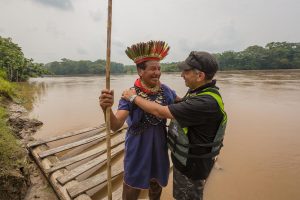The presence of the oil industry in the Ecuadorian Amazon along with the encroachments of modern infrastructure serve as a constant threat to the ancestral communities that reside there. For over 40 years, Raul Garcia, founder and CEO of Advantage Travel, has been working to develop a sustainable model of tourism in the region that provides an alternative source of income to the communities and operates in a way that preserves the rainforest.

From 1977 when he helped build the first river cruise on the Napo River to the present day as owner and operator of two cruise vessels on the same river, Raul has been building relationships with the local communities of the Ecuadorian Amazon and helping them navigate the difficulties of infiltration from civilization and the modern economy.
In 1985, he co-founded Ecuador’s Ecotourism Society, an association he would serve as president for from 1995 to 2003. In 1992, Raul founded Advantage Travel, adding a river cruise to the company portfolio in 2003. Part of the vision of adding a river cruise was to provide an employment opportunity for community members along the river. Today, over 50% of the crew aboard the company’s two vessels are from the local communities.
In 2010, Advantage Travel partnered with the Wildlife Conservation Society of Ecuador (WCS) and the local communities of the Ecuadorian Amazon to start a project that would protect charapas turtles, a species that is classified as “vulnerable” by the IUCN Red List. The local communities along the river protect the river banks where the charapas turtles lay their eggs, providing a controlled, safe environment for breeding. Once the hatchlings are ready to be released, guests of the river cruises take part in the freeing of the turtles into the wild. This sustainable model allows the communities to receive income for their labor in protecting the treasures of the Amazon.
Garcia has also set up an arrangement with the Quechua community along the Napo River in an effort to stabilize and increase the population of pink river dolphins. Since 2010, the Cocaya region of the rainforest has been designated as a protected area for pink river dolphins. This project supports conservation, creates a greater chance for tourists to see wildlife, and again, affords the communities the ability to support themselves in a sustainable way.
Looking forward, there is still much work to be done. Concerning the communities, Garcia says, “We are hoping that they can survive. That is an important point. Otherwise, they will be eaten by civilization and other cultures. Our main concern is to help them, share more with them, and provide them with opportunities.”
